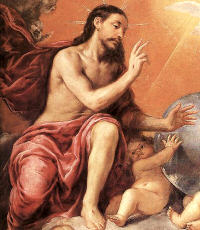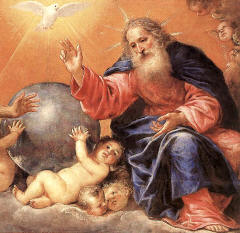Ordinary Time: June 4th
Solemnity of the Most Holy Trinity
The fundamental dogma, on which everything in Christianity is based, is that of the Blessed Trinity in whose name all Christians are baptized. The feast of the Blessed Trinity needs to be understood and celebrated as a prolongation of the mysteries of Christ and as the solemn expression of our faith in this triune life of the Divine Persons, to which we have been given access by Baptism and by the Redemption won for us by Christ. Only in heaven shall we properly understand what it means, in union with Christ, to share as sons in the very life of God.
The Solemnity of the Most Holy Trinity was introduced in the ninth century and was only inserted in the General Roman Calendar of the Church in the fourteenth century by Pope John XXII. But the cultus of the Trinity is, of course, to be found throughout the liturgy. Constantly the Church causes us to praise and adore the thrice-holy God who has so shown His mercy towards us and has given us to share in His life.
Mass Readings for the Solemnity of the Most Holy Trinity, Year A
The First Reading is from Exodus 34:4-6; 8-9. Exodus, the second book in the Old Testament, describes the exit of the Israelites from the slavery of Egypt under the leadership of Moses whom God appointed as their deliverer. The verses read today describe Moses's second meeting with the LORD on Mount Sinai. The LORD had told him to come there again so that he would rewrite the ten commandments on two new tables of stone. The mystery of the Blessed Trinity—was not revealed to the Jews of the Old Testament. They were not yet fit to accept this truth. Surrounded as they were by nations that practiced polytheism (many gods) there would be danger that the Jews would see three Gods in the Trinity—it would look like polytheism to them. Hence it was not revealed to them and therefore we have no Trinitarian text in the Old Testament which could be read on this feast of the Blessed Trinity.
The text chosen gives the basis for its eventual revelation. The LORD made a covenant with the Israelites. He made them his Chosen People, through whom he would eventually send his divine Son and the Holy Spirit to give man—the whole chosen human race—the possibility and the means of reaching the destination that he had planned for them from all eternity. The covenant made by God with Moses on Mount Sinai was the preparation for the revelation of the dogma of the Blessed Trinity and its relationship with our salvation.
The Second Reading is from 2 Cor. 13:11-13. These three verses are the conclusion of St. Paul's second letter to the Corinthians. The letter was written during his third missionary journey, 53-58, and probably from Ephesus where he was from 54-57. Paul had much advice and correction to give them and he also praises them. In these last verses he repeats his appeal for unity and fraternal charity and wishes the blessings of the Holy Trinity upon them.
By celebrating the feast of the three divine Persons today, we too are invoking on ourselves the blessings St. Paul invoked on the Corinthians. We need the grace of Our Lord Jesus Christ if we are to reach heaven. He has already put us on the right road by baptism, and has made us receptacles of grace, but that is only the first step although a supernatural one. Every human act we perform in the state of grace—even our eating and drinking, and our daily tasks—is moving us along the road to heaven. But if we lose the divine grace through mortal sin, all our actions, even holy actions, are useless as regards our heavenward journey.
The Gospel is from John 3:16-18. We have in these verses a part of the conversation that Jesus had with Nicodemus. Nicodemus was a rich Pharisee and a member of the Sanhedrin, the supreme ecclesiastical court of the Jews. He came to Jesus at night for fear of his fellow Pharisees. Although the Holy Spirit is not mentioned in this text from St. John's gospel, the text is included in the readings for the feast of the Blessed Trinity because two of the Persons are mentioned. They are clearly distinguished one from the other, yet both are the one God. God the Father sent God the Son into the world (in human nature) in order to bring eternal life within the reach of all men.
While we must admit from the evidence so clearly given in the story of our redemption and elevation to adopted divine sonship, that the three Persons of the Trinity cooperated in that work, we cannot claim we understand the mystery of three Persons in one God. We can and must admit the fact on the evidence presented to us, but we must also admit that our human intellects are too finite to grasp the essence, the nature of that fact.
How could it be otherwise? If our limited minds could grasp the divine nature and all its qualities it would no longer be divine—it would be limited like ourselves. There are many finite created things in our world which we cannot fully understand. How then could we claim that we should be able to understand the infinite? Of infinity itself we have only a negative description—something that has no beginning or an end. When we get to heaven our minds will be illuminated with greater grace but even then there will always be something new in God for us to see and admire. In the meantime our attitude toward the Trinity should be one of sincere gratitude for having placed us on the road to heaven.
Trinity Sunday
The dogma of faith which forms the object of the feast is this: There is one God and in this one God there are three Divine Persons; the Father is God, the Son is God, the Holy Spirit is God. Yet there are not three Gods, but one, eternal, incomprehensible God! The Father is not more God than the Son, neither is the Son more God than the Holy Spirit. The Father is the first Divine Person; the Son is the second Divine Person, begotten from the nature of the Father from eternity; the Holy Spirit is the third Divine Person, proceeding from the Father and the Son. No mortal can fully fathom this sublime truth. But I submit humbly and say: Lord, I believe, help my weak faith.
Why is this feast celebrated at this particular time? It may be interpreted as a finale to all the preceding feasts. All three Persons contributed to and shared in the work of redemption. The Father sent His Son to earth, for "God so loved the world as to give His only-begotten Son." The Father called us to the faith. The Son, our Savior Jesus Christ, became man and died for us. He redeemed us and made us children of God. He ever remains the liturgist par excellence to whom we are united in all sacred functions. After Christ's ascension the Holy Spirit, however, became our Teacher, our Leader, our Guide, our Consoler. On solemn occasions a thanksgiving Te Deum rises spontaneously from Christian hearts.
 The feast of the Most Holy Trinity may well be regarded as the Church's Te Deum of gratitude over all the blessings of the Christmas and Easter seasons; for this mystery is a synthesis of Christmas, Epiphany, Easter, Ascension and Pentecost. This feast, which falls on the first Sunday after Pentecost, should make us mindful that actually every Sunday is devoted to the honor of the Most Holy Trinity, that every Sunday is sanctified and consecrated to the triune God. Sunday after Sunday we should recall in a spirit of gratitude the gifts which the Blessed Trinity is bestowing upon us. The Father created and predestined us; on the first day of the week He began the work of creation. The Son redeemed us; Sunday is the "Day of the Lord," the day of His resurrection. The Holy Spirit sanctified us, made us His temple; on Sunday the Holy Spirit descended upon the infant Church. Sunday, therefore, is the day of the Most Holy Trinity.
The feast of the Most Holy Trinity may well be regarded as the Church's Te Deum of gratitude over all the blessings of the Christmas and Easter seasons; for this mystery is a synthesis of Christmas, Epiphany, Easter, Ascension and Pentecost. This feast, which falls on the first Sunday after Pentecost, should make us mindful that actually every Sunday is devoted to the honor of the Most Holy Trinity, that every Sunday is sanctified and consecrated to the triune God. Sunday after Sunday we should recall in a spirit of gratitude the gifts which the Blessed Trinity is bestowing upon us. The Father created and predestined us; on the first day of the week He began the work of creation. The Son redeemed us; Sunday is the "Day of the Lord," the day of His resurrection. The Holy Spirit sanctified us, made us His temple; on Sunday the Holy Spirit descended upon the infant Church. Sunday, therefore, is the day of the Most Holy Trinity.
—Excerpted from The Church's Year of Grace, Pius Parsch
Symbols of the Trinity: Equilateral Triangle; Circle of Eternity; Three interwoven Circles; Triangle in Circle; Circle within Triangle; Interwoven Circle and Triangle; Two Triangles interwoven in shape of Star of David; Two Triangles in shape of Star of David interwoven with Circle; Trefoil; Trefoil and Triangle; Trefoil with points; Triquetra; Triquetra and circle; Shield of the Holy Trinity; Three Fishes linked together in shape of a triangle; Cross and Triangle overlapping; Fleur de Lys; St. Patrick's Shamrock.

No comments:
Post a Comment